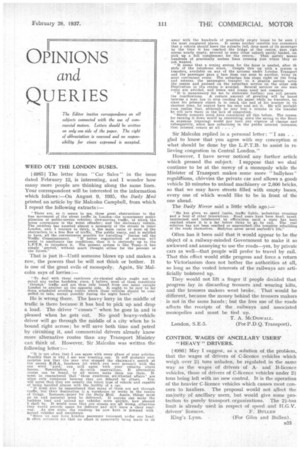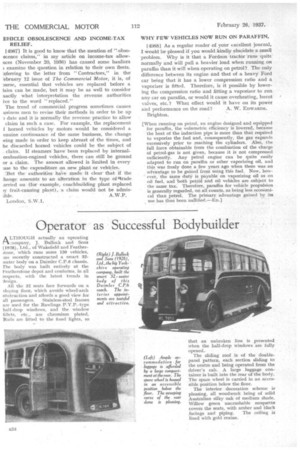OPINIONS
Page 57

Page 58

If you've noticed an error in this article please click here to report it so we can fix it.
and
QUERIES
WEED OUT THE LONDON BUSES.
[49851 The letter from " Car Sales" in the issue dated February 12, is interesting, and I wonder how many more people are thinking along the same lines. Your correspondent will be interested in the information which follows :—On August 9, 1935, the Daily Mail printed an article by Sir Malcolm Campbell, from which I repeat the following extracts :—
Tlaere are, so it seenis to me, three great obstructions to the free movement of the street traffic in London—the unnecessary multiplication of public-service vehicles; slow-moving traffic, ol which the horse conveyance is the worst offender; and the stationary vehicle. The omnibus has asserted almost a monopoly of the streets in inner London, and, I venture to think, is the main cause of most pE the obstruction to a free flow of traffic. The public wants, and is entitled to have, all the conveniences possible for travelling " (better tell the
Traffic Commissioners). -If better organization of services will assist to ameliorate the conditions, then it is obviously up to the L.P.T.B. to introduce it. The present system is like Topsy—it has simply ' ginned,' without much thought either for the present or the future.
That is just it—Until someone blows up and makes a row, the powers that be will not think or bother. It is one of the great evils of monopoly. Again, Sir Malcolm says of lorries:—
To deal with these eumbrons six-wheeled affairs aught not to entail any undue hardship; since, I believe, most of them constitute ' through ' traffic and are thus only bound from one point outside London to another on the opposite side. It ought to he easy to lay down scheduled avoiding mutes which these vehicles should be rouxpellet) to take, except possibly during the night hours.'
He is wrong there. The heavy lorry in the middle of traffic is there because it has had to pick up and drop a load. The driver " cusses" when he goes in and is pleased when he gets out. No good heavy-vehicle driver will go through the middle of a city when he is bound right across; he will save both time and petrol by circuiting it, and commercial drivers already know more alternative routes than any Transport Ministry can think of. However, Sir Malcolm was written the following letter
rt is not often that i can agree with every phase of your articles. Possibly that is why I em now breaking out. It wth probably even surprise you that the snan who stopped the chairman's speech at the recent It.H.A. luncheon (at which you were presentl with the one word ' good.' can still agree with your remarks about lorries. Nevertheless, I do—with reservations. If alternative routes can be found, by all means make them use them. It must be remembered that 'these cumbrous six-wheeled affairs ' are
often only cumbrous because they are delayed by others, you will agree that they are usually the latest type of vehicle and capable of being handled almost with the facility of a car. • " It must also be remembered that many of -them are not through traffic, but their destination is a warehouse or works in the centre of things. Instance—paper for the Dairy' Moif. Again, things roust go on and material must be delivered, II anyone can make the builders load and unload our vehicles more quickly, how pleased I shall be. It would seem that our streets are all wrong, otherwise they would provide space for delivery and still leave a clear roadway. As you state, the roadway we now have is jammed with horsed vehicles and omnibuses.
"Since we now have London passenger transport under one head. it ften astounds rno that no effort is apnarently being made to do away with the hundreds of practically empty buses to be seen i the most congested places. It seems neither sensible nor economics that a vehicle should leave the suburbs full, drop most of its passenger by the time it has reached the fringe of the centre, pass righ across nearly empty, proceed to some other suburb partly loaded, am pick up a full complement for the return. That merely meant hundreds of practically useless lines crossing just where they an not wanted.
"It seems that a zoning system for the fares is needed, after th style of the telephone zones. Couple this imp with a system a transfers, available en any of the systems under London Transport and the passenger pays a fare from one zone to another, using th most convenient route. The suburban bus stops right on the Meg. and returns, the passengers transfer to a shuttle service acres the centre and _proceed on the suburban service on the other side Duplication in the centre is avoided. Several services on one mail route eve avoided, and buses and trams need not compete.
It is unnecessary for me to elaborate further; you will perceivi the ramifications. A certain amount of growling will be heard because a man has to stop leading his paper 'while be transfers, bu since his primary object is to reach the end of his journey in th, shortest time, he cannot have his cake and eat it. He will proliabll soon realize that, although he may lose a minute in the transfer he will save many in the lack of congestion.
".Surely someone must have considered all this before. The reason: for turning it down would be Interesting, since the saving to the Boarr in expenses (running) would pay back any expetme al change and subsequently, allow fare reductions in the public interest (assumien that interest counts at all . .
Sir Malcolm replied in a personal letter: "I am . . . glad to know that you agree with my conception o) what should be done by the L.P.T.B. to assist in re. lieving congestion in Central London."
However, I have never noticed any further article which pressed the subject. I suppose that we shal continue to be at the mercy of a monopoly while the Minister of Transport makes some more "ballyhoo " regulations, chivvies the private car and allows a goodi vehicle 10 minutes to unload machinery or 2,000 bricks, so that we may have streets filled with empty buses, every one of which would like to be in front of the one ahead.
The Daily Mirror said a little while ago:— He has given 118 speed limits, traffic lights, pedestrian crossings and a host of other innovations. Road users have been fined, taxed. imprisoned and belaboured. by officialdom until a state has been
reached where it is a far better thing to go. by rail. The real solution has not been reached or approached—the complete rebuilding of the roads themselves. Ballyhoo never saved anybody's life."
Often has it been said that it would appear to be the object of a railway-minded Government to make it so awkward and annoying to use the roads—yes, by private cars as well—that people will prefer to travel by rail. That this effect would stifle progress and force a return to Victorianism does not bother the authorities at all, so long as the vested interests of the railways are artificially bolstered up.
They would not lift a finger if people decided that progress lay in discarding trousers and wearing kilts, and the trousers makers went broke. That would be different, because the money behind the trousers makers is not in the same hands ; but the free use of the roads affects the receipts of the railways and associated monopolies and must be tied up.
T. A. McDowALL.
London, S.E.5. (For P.D.Q. Transport).
CONTROL WAGES OF ANCILLARY USERS' " HEAVY " DRIVERS.
[080) May I suggest, as a solution of the problem, that the wages of drivers of C-licence vehicles which weigh over 21 tons unladen, be regulated in the same way as the wages of drivers of Aand B-licence vehicles, those of drivers of C-licence vehicle's under 2A tons being left with no new control. It is the operation of the heavier C-licence vehicles which causes most concern to hauliers. The proposal would not affect the majority of ancillary users, but would give some protection to purely transport organizations. The 2i-ton limit is already used in respect of speed and TI.G.V.
drivers' licences. F. BULLEN King's Lynn. (For Giles and BuIlen). EHICLE OBSOLESCENCE AND INCOME-TAX RELIEF.
[49871 It is good to know that the mention of " obsoscence claims," in my article on income-tax allowaces (November 20, 1936) has caused some hauliers ) examine the question in relation to their own fleets. 4ferring to the letter from " Contractors," in the 'ebruary 12 issue of The Commercial Motor, it is, of Durse, essential that vehicles are replaced before a laim can be made, but it may be as well to consider xactly what interpretation the revenue authorities ive to the word "replaced."
The trend of commercial progress sometimes causes usiness men to revise their methods in order to be up 3 date and it is normally the revenue practice to allow claim in such a case. For example, the replacement f horsed vehicles by motors would be considered a enuine continuance of the same business, the change leing made in order to keep abreast of the times, and he discarded horsed vehicles could be the subject of . claim. If steamers have been replaced by internalombustion-engined vehicles, there can still be ground or a claim. The amount allowed is limited in every :ase to the expenditure on new. plant or vehicles.
But the authorities have made it clear thai if the hange amounts to an alteration in the type óf trade arried on (for example, coachbuilding plant replaced )y fruit-canning plant), a claim would not be admis ible. A.W.P. London, S.W.1. WHY FEW VEHICLES NOW RUN ON PARAFFIN. [4988] As a regular reader of your excellent journal, I would be pleased if you would kindly elucidate a small problem. Why is it that a Fordson tractor runs quite normally and will pull a heavier load when running on paraffin than it will when operating on petrol? The only difference between its engine and that of a heavy Ford car being that it has a lower compression ratio and a vaporizer is fitted. Therefore, is it possible by lowering the compression ratio and fitting a vaporizer to run any car on paraffin, or would it cause overheating, burnt valves, etc.? What effect would it have on its power and performance on the road? A. W. EDWARDS. Brighton.
[When running on petrol, an engine designed and equipped for paraffin, the volumetric efficiency is lowered, because the heat of the induction pipe is more than that required to vaporize the fuel and, consequently, the gas expands excessively prior to reaching the cylinders. Also, the full force obtainable from the combustion of the charge of petrol-gas is not given, because it is not compressed sufficiently. Any petrol engine can be quite easily adapted to run on paraffin or other vaporizing oil, and this was freely done a few years ago when there was an advantage to be gained from using this fuel. Now, how.. ever:the same duty is payable on vaporizing oil as on oil fuel, and both petrol and oil vehicles are subject to the same tax. Therefore, paraffin for vehicle propulsion is generally regarded, on all counts, as being less economical than petrol. The primary advantage gained by its use has thus been nullified.—ED.]




























































































